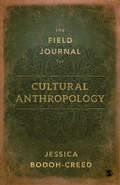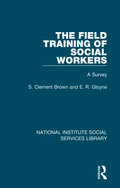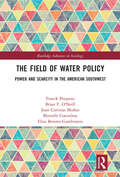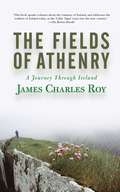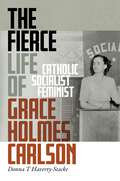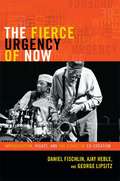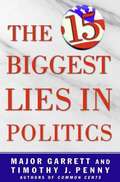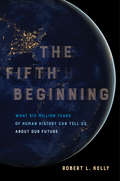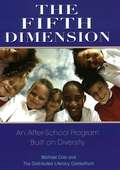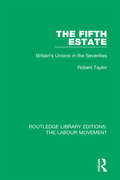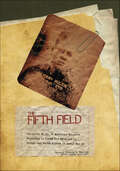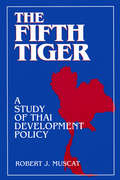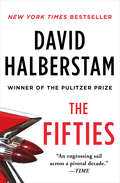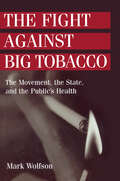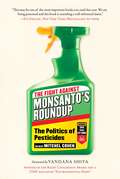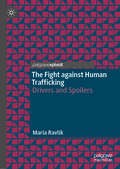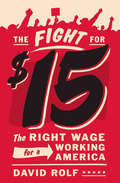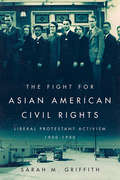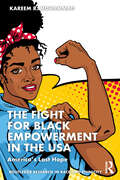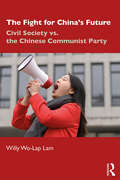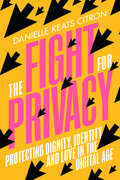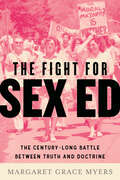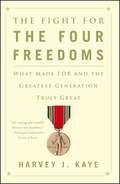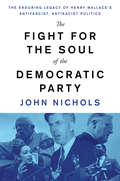- Table View
- List View
The Field Journal for Cultural Anthropology
by Dr. Jessica Bodoh-CreedThink about the world around you in new and different ways! The Field Journal for Cultural Anthropology takes students on an active journey of activities and research in order to apply the concepts they learn in the classroom. With over a decade's worth of teaching and researching in anthropology, author Jessica Bodoh-Creed’s interactive book prompts students to practice fieldwork and ethnographic skills such as interviewing, taking field notes, creating maps and kinship charts, and overall gathering of data to become effective researchers. The topics cover the gamut of traditional cultural anthropology making this field journal relatable and engaging for students of all ages and backgrounds.
The Field Training of Social Workers: A Survey (National Institute Social Services Library)
by S. Clement Brown E. R. GloyneFirst published in 1966, the original blurb read: Learning with the help of skilled practitioners is as essential in training for social work as for medicine and teaching. Where do students of social work go for field training and why? What is it hoped that they will learn through their experience? What responsibilities are they given and who guides their learning? Partnership between social workers and academic staff in working out these questions is considered at a critical time in the changing perspectives and expansion of social services. The staff of colleges and social agencies, students, and professional organizations have helped to produce the facts and views on which this survey is based.
The Field of Water Policy: Power and Scarcity in the American Southwest (Routledge Advances in Sociology)
by Franck Poupeau Brian F. O'Neill Joan Cortinas Muñoz Murielle Coeurdray Eliza Benites-GambirazioBringing together the analysis of a diverse team of social scientists, this book proposes a new approach to environmental problems. Cutting through the fragmented perspectives on water crises, it seeks to shift the analytic perspectives on water policy by looking at the social logics behind environmental issues. Most importantly, it analyzes the dynamic influences on water management, as well as the social and institutional forces that orient water and conservation policies. The first work of its kind, The Field of Water Policy: Power and Scarcity in the American Southwest brings the tools of Pierre Bourdieu’s field sociology to bear on a moment of environmental crisis, with a study of the logics of water policy in the American Southwest, a region that allows us to see the contest over the management of scarce resources in a context of lasting drought. As such, it will appeal to scholars in the social and political sciences with interests in the environment and the management of natural resources.
The Fields of Athenry: A Journey Through Ireland
by James Charles RoyIn The Fields of Athenry, James Charles Roy leads us through the Irish past and present by way of his own personal struggles and misadventures in renovating Moyode Castle, an old tower house that he purchased more than thirty years ago. While he pieces together its four-hundred-year-old past, the castle becomes a powerful symbol for Roy - it is battered by waves of history, yet timeless and resilient. Roy’s personal struggles with the land and its people open for him a wide-ranging historical conversation on Ireland today and our sense of history more broadly. How do we reconcile the historical nostalgia attached to Ireland with the boom times that the "Celtic Tiger" enjoys today? With this question in mind, Roy searches for the answer of what attracts us - or, perhaps more aptly, him - to the rubble of a castle from Irish days long past.
The Fierce Life of Grace Holmes Carlson: Catholic, Socialist, Feminist
by Donna T. Haverty-StackeShares the story of the revolutionary Marxist and Catholic Grace Holmes Carlson and her life-long dedication to challenging social and economic inequalityOn December 8, 1941, Grace Holmes Carlson, the only female defendant among eighteen Trotskyists convicted under the Smith Act, was sentenced to sixteen months in federal prison for advocating the violent overthrow of the government. After serving a year in Alderson prison, Carlson returned to her work as an organizer for the Socialist Workers Party (SWP) and ran for vice president of the United States under its banner in 1948. Then, in 1952, she abruptly left the SWP and returned to the Catholic Church. With the support of the Sisters of St. Joseph, who had educated her as a child, Carlson began a new life as a professor of psychology at St. Mary’s Junior College in Minneapolis where she advocated for social justice, now as a Catholic Marxist.The Fierce Life of Grace Holmes Carlson: Catholic, Socialist, Feminist is a historical biography that examines the story of this complicated woman in the context of her times with a specific focus on her experiences as a member of the working class, as a Catholic, and as a woman. Her story illuminates the workings of class identity within the context of various influences over the course of a lifespan. It contributes to recent historical scholarship exploring the importance of faith in workers’ lives and politics. And it uncovers both the possibilities and limitations for working-class and revolutionary Marxist women in the period between the first and second wave feminist movements. The long arc of Carlson’s life (1906–1992) ultimately reveals significant continuities in her political consciousness that transcended the shifts in her particular partisan commitments, most notably her life-long dedication to challenging the root causes of social and economic inequality. In that struggle, Carlson ultimately proved herself to be a truly fierce woman.
The Fierce Urgency of Now: Improvisation, Rights, and the Ethics of Cocreation
by George Daniel Fischlin Heble Ajay LipsitzThe Fierce Urgency of Now links musical improvisation to struggles for social change, focusing on the connections between the improvisation associated with jazz and the dynamics of human rights struggles and discourses. The authors acknowledge that at first glance improvisation and rights seem to belong to incommensurable areas of human endeavor. Improvisation connotes practices that are spontaneous, personal, local, immediate, expressive, ephemeral, and even accidental, while rights refer to formal standards of acceptable human conduct, rules that are permanent, impersonal, universal, abstract, and inflexible. Yet the authors not only suggest that improvisation and rights can be connected; they insist that they must be connected. Improvisation is the creation and development of new, unexpected, and productive cocreative relations among people. It cultivates the capacity to discern elements of possibility, potential, hope, and promise where none are readily apparent. Improvisers work with the tools they have in the arenas that are open to them. Proceeding without a written score or script, they collaborate to envision and enact something new, to enrich their experience in the world by acting on it and changing it. By analyzing the dynamics of particular artistic improvisations, mostly by contemporary American jazz musicians, the authors reveal improvisation as a viable and urgently needed model for social change. In the process, they rethink politics, music, and the connections between them.
The Fifteen Biggest Lies In Politics
by Major Garrett Timothy J. PennyIn the world of politics, it's hard to separate the truth from the lies. In this strongly argued but nonpartisan book, Major Garrett and Timothy J. Penny draw on their combined decades of experience watching government work to illuminate the deceptions and delusions to which we as citizens are subjected every election season. Here are some of the lies: <P> Tax Cuts Are Good <P> Social Security Is a Sacred Government Trust <P> Medicare Works <P> Money Buys Elections <P> Republicans Believe in Smaller Government <P> Democrats Are Compassionate<P>
The Fifth Beginning: What Six Million Years of Human History Can Tell Us about Our Future
by Robert L. Kelly"I have seen yesterday. I know tomorrow." This inscription in Tutankhamun's tomb summarizes The Fifth Beginning. Here, archaeologist Robert L. Kelly explains how the study of our cultural past can predict the future of humanity. In an eminently readable style, Kelly identifies four key pivot points in the six-million-year history of human development: the emergence of technology, culture, agriculture, and the state. In each example, the author examines the long-term processes that resulted in a definitive, no-turning-back change for the organization of society. Kelly then looks ahead, giving us evidence for what he calls a fifth beginning, one that started about AD 1500. Some might call it "globalization," but the author places it in its larger context: a five-thousand-year arms race, capitalism's global reach, and the cultural effects of a worldwide communication network. Kelly predicts that the emergent phenomena of this fifth beginning will include the end of war as a viable way to resolve disputes, the end of capitalism as we know it, the widespread shift toward world citizenship, and the rise of forms of cooperation that will end the near-sacred status of nation-states. It's the end of life as we have known it. However, the author is cautiously optimistic: he dwells not on the coming chaos, but on humanity's great potential.
The Fifth Dimension: An After-School Program Built on Diversity
by Michael Cole Distributive Literacy ConsortiumThe significant increase in the number of working mothers over the last twenty years has led to widespread worries about the plight of “latchkey kids,” who return from school each day to empty homes. Concerned that unsupervised children might be at greater risk of delinquency, schools and communities across the nation began providing after-school activities. But many of these programs were hastily devised with little understanding of what constitutes a quality program that meets children’s developmental needs. The Fifth Dimension explores and evaluates one of the country’s most successful and innovative after-school programs, providing insightful and practical lessons about what works and doesn’t work after-school. The Fifth Dimension program was established in the 1980s as a partnership between community centers and local colleges to establish an educational after-school program. With an emphasis on diversity and computer technology, the program incorporates the latest theories about child development and gives college students the opportunity to apply their textbook understanding of child development to real learning environments. The Fifth Dimension explores the design, implementation, and evaluation of this thriving program. The authors attribute the success of the Fifth Dimension to several factors. First, the program offers a balance of intellectually enriching exercises with development enhancing games. Second, by engaging undergraduates as active participants in both learning and social activities, the program gives local community organizations a large infusion of high-quality help for their educational efforts. Third, by rewarding children for their achievements and good behavior with greater flexibility in choosing their own schedules, the Fifth Dimension acts as a powerful, enduring motivator. The Fifth Dimension program serves as a model for what an enriching after-school program can be. The product of years of innovation and careful assessment, The Fifth Dimension is a valuable resource for all who are interested in developing successful community-based learning programs.
The Fifth Estate: Britain's Unions in the Seventies (Routledge Library Editions: The Labour Movement #37)
by Robert TaylorFirst published in 1978. Britain’s unions were blamed by many people for the country’s post-war economic decline. Portrayed as greedy wreckers who wanted to run the country, they had become scapegoats for the state of the nation. This anatomy of Britain’s diverse and complex trade union movement sets out to question that widespread opinion. The main argument advanced in the study is that unions in Britain were too weak, not too strong. From the 1940s until the 1970s, Robert Taylor believes, they had failed to achieve the constructive influence over British society that union movements elsewhere in western Europe had managed to gain. Considering the major and medium-sized unions separately, he examines the sudden and rapid growth of unionisation in Britain, the structure of the unions, their effectiveness, the influence they had, their international record, and the nature of trade union democracy.
The Fifth Field: The Story of the 96 American Soldiers Sentenced to Death and Executed in Europe and North Africa in World War II
by French L. MacLeanUnnamed Graves, a Secret Cemetery, Files Closed to the Public and Stored in "The Vault." During World War II, in the North African/Mediterranean and European Theaters of Operation, 96 American soldiers were convicted by Army General Courts-Martial and executed for desertion, murder and rape. Their victims were 26 fellow American soldiers and 71 British, French, Italian, Polish and Algerian civilians. The executions were not ad hoc killings. General Eisenhower, or another theater commander, approved every proceeding, but the Army did not trumpet the crimes. After the war, the Army searched for a suitable site to inter the remains of all 96 men. It chose a plot of land adjacent to – but technically outside of – the World War I American cemetery of Oise-Aisne. The area is separated from the main cemetery by a high stone wall, concealed from view, and is closed to casual visitors. Called "Plot E" by the staff, others refer to it as "The Fifth Field." The judicial files on the 96 were even harder to find – until now.
The Fifth Tiger: Study of Thai Development Policy
by Robert J. MuscatThailand's dynamic economic development has earned it a reputation as the "Fifth Tiger" (following on the heels of the superperforming "Four Tigers" - South Korea, Taiwan, Singapore and Hong Kong). This is a study of Thailand's development experience since 1955.
The Fifties
by David HalberstamA social, economic, political and cultural history of the post-World-War II period which impacted the decade of turbulence that followed.
The Fifties: A Cultural History
by David HalberstamThis vivid New York Times bestseller about 1950s America from a Pulitzer Prize–winning journalist is &“an engrossing sail across a pivotal decade&” (Time). Joe McCarthy. Marilyn Monroe. The H-bomb. Ozzie and Harriet. Elvis. Civil rights. It&’s undeniable: The fifties were a defining decade for America, complete with sweeping cultural change and political upheaval. This decade is also the focus of David Halberstam&’s triumphant The Fifties, which stands as an enduring classic and was an instant New York Times bestseller upon its publication. More than a survey of the decade, it is a masterfully woven examination of far-reaching change, from the unexpected popularity of Holiday Inn to the marketing savvy behind McDonald&’s expansion. A meditation on the staggering influence of image and rhetoric, The Fifties is vintage Halberstam, who was hailed by the Denver Post as &“a lively, graceful writer who makes you . . . understand how much of our time was born in those years.&” This ebook features an extended biography of David Halberstam.
The Fight Against Big Tobacco: The Movement, the State and the Public's Health (Social Problems And Social Issues Ser.)
by Mark WolfsonTobacco control leaders were extremely proud of the movement's achievements in the state of Minnesota. In sharing their perspectives and experiences with Mark Wolfson, they found a way of making sure that the story would get told. His training in social movements had given him an appreciation of the importance of understanding the social infrastructure on which movements are built, and Minnesota had built heavily on the infrastructure of health care and public health. What became apparent is that the struggle against the tobacco industry in Minnesota involved a close, collaborative relationship between government (or "state") actors and the leaders of the tobacco control movement.Wolfson develops both of these themes: building on the infrastructure of health, and state-movement interpenetration, to understand the emergence, growth, and outcomes of the tobacco control movement in Minnesota. He focuses on the advantages and constraints associated with these two related themes. He goes beyond the case study method to assess the generalizability of the pattern, and whether the same sort of movement can be used by other states in North America, and even in other countries and their social movements.How has the tobacco control movement become such a significant and successful force in shaping public policy, social norms, and the habits of millions of Americans? In this first such detailed study by a sociologist, Wolfson documents how the movement has grown over nearly three decades by building an infrastructure of health organizations and health professionals, and by fostering relationships with government. Rich in survey data, extensive interviews, and archival sources, this text is essential reading for courses in social problems, social movements, and public health. The general reader will also find it engaging, given the issues of tobacco use as an addiction and a social problem.
The Fight Against Monsanto's Roundup: The Politics of Pesticides
by Vandana Shiva Mitchel CohenA Comprehensive Look at the Worldwide Battle to Defend Ourselves and Our Environment Against the Peddlers of Chemical Poisons Chemical poisons have infiltrated all facets of our lives – housing, agriculture, work places, sidewalks, subways, schools, parks, even the air we breathe. More than half a century since Rachel Carson issued Silent Spring – her call-to-arms against the poisoning of our drinking water, food, animals, air, and the natural environment – The Fight Against Monsanto's Roundup takes a fresh look at the politics underlying the mass use of pesticides and the challenges people around the world are making against the purveyors of poison and the governments that enable them. The scientists and activists contributing to The Fight Against Monsanto's Roundup, edited by long-time Green activist Mitchel Cohen, explore not only the dangers of glyphosate – better known as “Roundup” – but the campaign resulting in glyphosate being declared as a probable cancer-causing agent. In an age where banned pesticides are simply replaced with newer and more deadly ones, and where corporations such as Monsanto, Bayer, Dow and DuPont scuttle attempts to regulate the products they manufacture, what is the effective, practical, and philosophical framework for banning glyphosate and other pesticides?The Fight Against Monsanto's Roundup: The Politics of Pesticides takes lessons from activists who have come before and offers a radical approach that is essential for defending life on this planet and creating for our kids, and for ourselves, a future worth living in.
The Fight against Human Trafficking: Drivers and Spoilers
by Maria RavlikThis book provides a quantitative, cross-nationally comparative, longitudinal, and multilevel study of the drivers and spoilers of national governments’ anti-trafficking measures. Both macro-level determinants of anti-trafficking enforcement and micro-level foundations of human trafficking are unfolded and explored. Large-N comparative research examines how characteristics of countries interact with people’s attitudes towards violence to better understand what creates environments that are more or less supportive of governments’ anti-trafficking efforts. The results presented in the book are highly relevant from the perspectives of global governance and human rights protection.
The Fight for $15: The Right Wage for a Working America
by David Rolf&“Rolf shows that raising the minimum wage to $15 is both just and necessary, lest the American dream of middle class prosperity turn into a nightmare&” (David Cay Johnston, Pulitzer Prize–winning journalist). Combining history, economics, and commonsense political wisdom, The Fight for $15 makes a deeply informed case for a national fifteen-dollars-an-hour minimum wage as the only practical solution to reversing America&’s decades-long slide toward becoming a low-wage nation. Drawing both on new scholarship and on his extensive practical experiences organizing workers and grappling with inequality across the United States, David Rolf, president of SEIU 775—which waged the successful Seattle campaign for a fifteen dollar minimum wage—offers an accessible explanation of &“middle out&” economics, an emerging popular economic theory that suggests that the origins of prosperity in capitalist economies lie with workers and consumers, not investors and employers. A blueprint for a different and hopeful American future, The Fight for $15 offers concrete tools, ideas, and inspiration for anyone interested in real change in our lifetimes. &“The author&’s plainspoken approach and stellar scholarship illuminate in-depth discussions about the deliberate policy decisions that began to decimate the middle class at the start of the 1980s as well as the insidious new ways in which big business continues to attack American workers today via stagnant wages, rampant subcontracting, unpredictable scheduling, and other detrimental practices associated with the so-called &‘share economy.&’&” —Kirkus Reviews &“David Rolf has become the most successful advocate for raising wages in the twenty-first century.&” —Andy Stern, senior fellow at Columbia University&’s Richard Paul Richman Center for Business, Law, and Public Policy
The Fight for Asian American Civil Rights: Liberal Protestant Activism, 1900-1950
by Sarah M GriffithFrom the early 1900s, liberal Protestants grafted social welfare work onto spiritual concerns on both sides of the Pacific. Their goal: to forge links between whites and Asians that countered anti-Asian discrimination in the United States. Their test: uprooting racial hatreds that, despite their efforts, led to the shameful incarceration of Japanese Americans in World War II. Sarah M. Griffith draws on the experiences of liberal Protestants, and the Young Men's Christian Association in particular, to reveal the intellectual, social, and political forces that powered this movement. Engaging a wealth of unexplored primary and secondary sources, Griffith explores how YMCA leaders and their partners in the academy and distinct Asian American communities labored to mitigate racism. The alliance's early work, based in mainstream ideas of assimilation and integration, ran aground on the Japanese exclusion law of 1924. Yet their vision of Christian internationalism and interracial cooperation maintained through the World War II internment trauma. As Griffith shows, liberal Protestants emerged from that dark time with a reenergized campaign to reshape Asian-white relations in the postwar era.
The Fight for Black Empowerment in the USA: America’s Last Hope (Routledge Research in Race and Ethnicity #1)
by Kareem R. MuhammadThis book advances the view that concentrated black power is the backbone of the Democratic Party and, as such, black empowerment represents the last hope for the US both domestically and internationally. Through analyses of secondary data, historical archives, and a variety of political and economic statistical indicators, it examines the relationship between black empowerment and America's global stature across its history, exploring the socio-historical context in which obstacles to black empowerment have occurred and the strategies that have been adopted across time for its realization. An examination of what Black political, legal, economic and cultural power looks like, The Fight for Black Empowerment in the USA makes an urgent call for the up-lift and empowerment of the black population, without which the nation faces irreversible political and economic dysfunction domestically, and a loss of its status as a global superpower. As such, it will appeal to scholars across the social sciences with interests in racial and ethnic inequalities and contemporary American society.
The Fight for China's Future: Civil Society vs. the Chinese Communist Party
by Willy Wo-Lap LamThe Fight For China’s Future throws light on the quintessence of 21st Century Chinese politics through the prism of the struggle between the Chinese Communist Party (CCP) and China’s vibrant intelligentsia and civil society. This book examines Xi Jinping’s 24-hour, multi-dimensional, AI-enabled police-state apparatus and explores the CCP’s policy towards civil society. Through exclusive interviews with activists from different provinces, it analyses the experiences and aspirations of key stakeholders in Chinese society, especially intellectuals, human rights attorneys and Christian worshippers. Providing an examination of recent global trends in relation to CCP policies, including China’s relationship with the US, it also goes on to explore the possible trajectories of future change. Featuring an assessment of Xi Jinping’s leadership style and the opportunities this has given certain groups to promote the rule of law, media freedom and other global norms, this book will be invaluable to students of Chinese politics, society and culture.
The Fight for Privacy: Protecting Dignity, Identity, and Love in the Digital Age
by Danielle Keats CitronThe essential road map for understanding—and defending—your right to privacy in the twenty-first century. Privacy is disappearing. From our sex lives to our workout routines, the details of our lives once relegated to pen and paper have joined the slipstream of new technology. As a MacArthur fellow and distinguished professor of law at the University of Virginia, acclaimed civil rights advocate Danielle Citron has spent decades working with lawmakers and stakeholders across the globe to protect what she calls intimate privacy—encompassing our bodies, health, gender, and relationships. When intimate privacy becomes data, corporations know exactly when to flash that ad for a new drug or pregnancy test. Social and political forces know how to manipulate what you think and who you trust, leveraging sensitive secrets and deepfake videos to ruin or silence opponents. And as new technologies invite new violations, people have power over one another like never before, from revenge porn to blackmail, attaching life-altering risks to growing up, dating online, or falling in love. A masterful new look at privacy in the twenty-first century, The Fight for Privacy takes the focus off Silicon Valley moguls to investigate the price we pay as technology migrates deeper into every aspect of our lives: entering our bedrooms and our bathrooms and our midnight texts; our relationships with friends, family, lovers, and kids; and even our relationship with ourselves. Drawing on in-depth interviews with victims, activists, and advocates, Citron brings this headline issue home for readers by weaving together visceral stories about the countless ways that corporate and individual violators exploit privacy loopholes. Exploring why the law has struggled to keep up, she reveals how our current system leaves victims—particularly women, LGBTQ+ people, and marginalized groups—shamed and powerless while perpetrators profit, warping cultural norms around the world. Yet there is a solution to our toxic relationship with technology and privacy: fighting for intimate privacy as a civil right. Collectively, Citron argues, citizens, lawmakers, and corporations have the power to create a new reality where privacy is valued and people are protected as they embrace what technology offers. Introducing readers to the trailblazing work of advocates today, Citron urges readers to join the fight. Your intimate life shouldn’t be traded for profit or wielded against you for power: it belongs to you. With Citron as our guide, we can take back control of our data and build a better future for the next, ever more digital, generation.
The Fight for Sex Ed: The Century-Long Battle Between Truth and Doctrine
by Margaret Grace MyersThe first comprehensive trade history of sex ed in American schools—and an impassioned call to reform sex ed into a powerful tool for reproductive justice and social equalityThe U.S. has some of the highest rates of STIs and teen pregnancies in the industrialized world. A comprehensive sex education curriculum—which teaches facts on contraception, prophylactics, consent, and STIs—has been available since the 90s. Yet the majority of states require that sex education stress abstinence, and 22 states do not require sex ed in public schools at all.In The Fight for Sex Ed, writer, advocate, and historian Margaret Myers shows us how we got here. While the earliest calls for sex ed came from a coalition of religious leaders and doctors at the turn of the century who sought to control the prevalence of STIs, the advent of antibiotics and modern condoms meant that abstinence was no longer good public health policy. The religious right, however, continued to frame it as such, using its impressive machinery to replace scientific facts with conservative Christian values.Because sex ed is not mandated at the federal level, these battles have played out locally throughout the decades: through rigged school boards, administrative oustings, court cases, unjust firings, scare tactics, and threats. Myers also shows how the religious right has worked to narrow the discourse around sex ed, often dictating the terms of debate almost entirely.What we teach young people has serious ramifications for reproductive justice, LGBTQ+ rights, gender equality, and public health. Sex education lies at the intersection of these hugely important cultural forces, yet it has been largely invisible. This book illuminates its potential—and its power.
The Fight for the Four Freedoms
by Harvey J. KayeOn January 6, 1941, the Greatest Generation gave voice to its founding principles, the Four Freedoms: Freedom from want and from fear. Freedom of speech and religion. In the name of the Four Freedoms they fought the Great Depression. In the name of the Four Freedoms they defeated the Axis powers. In the process they made the United States the richest and most powerful country on Earth. And, despite a powerful, reactionary opposition, the men and women of the Greatest Generation made America freer, more equal, and more democratic than ever before. Now, when all they fought for is under siege, we need to remember their full achievement, and, so armed, take up again the fight for the Four Freedoms.n's extraordinary struggles and accomplishments. By making America, in FDR's words, "fairly radical for a generation," the Greatest Generation had their true rendezvous with destiny. And Kaye convinces that to honor them, it is time for another generation of Americans to do the same, before it is too late.
The Fight for the Soul of the Democratic Party: The Enduring Legacy of Henry Wallace's Anti-Fascist, Anti-Racist Politics
by John NicholsFighting fascism at home and abroad begins with the consolidation of a progressive politicsSeventy-five years ago, Henry Wallace, then the sitting Vice President of the United States, mounted a campaign to warn about the persisting "Danger of American Fascism." As fighting in the European and Japanese theaters drew to a close, Wallace warned that the country may win the war and lose the piece; that the fascist threat that the U.S. was battling abroad had a terrifying domestic variant, growing rapidly in power: wealthy corporatists and their allies in the media. Wallace warned that if the New Deal project was not renewed and expanded in the post-war era, American fascists would use fear mongering, xenophonbia, and racism to regain the economic and political power that they lost. He championed an alternative, progressive vision of a post-war world-an alternative to triumphalist "American Century" vision then rising--in which the United States rejected colonialism and imperialism. Wallace's political vision - as well as his standing in the Democratic Party - were quickly sidelined. In the decades to come, other progressive forces would mount similar campaigns: George McGovern and Jesse Jackson more prominently. As John Nichols chronicles in this book, they ultimately failed - a warning to would-be reformers today - but their successive efforts provide us with insights into the nature of the Democratic Party, and a strategic script for the likes of Bernie Sanders and Alexandria Ocasio-Cortez.
